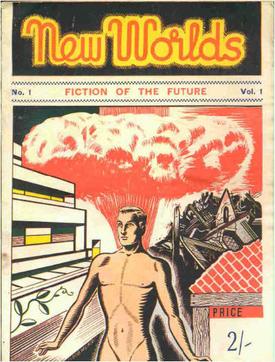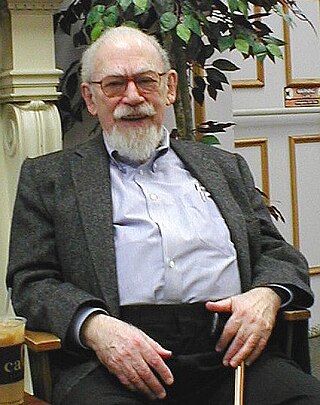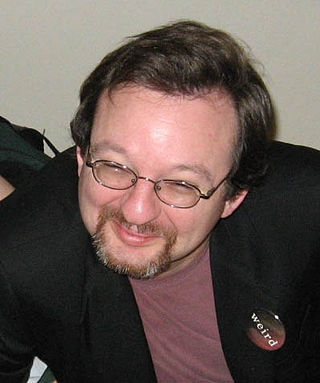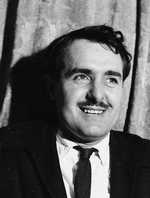Related Research Articles
Lester del Rey was an American science fiction author and editor. He was the author of many books in the juvenile Winston Science Fiction series, and the editor at Del Rey Books, the fantasy and science fiction imprint of Ballantine Books, along with his fourth wife Judy-Lynn del Rey.

Science Fantasy, which also appeared under the titles Impulse and SF Impulse, was a British fantasy and science fiction magazine, launched in 1950 by Nova Publications as a companion to Nova's New Worlds. Walter Gillings was editor for the first two issues, and was then replaced by John Carnell, the editor of New Worlds, as a cost-saving measure. Carnell edited both magazines until Nova went out of business in early 1964. The titles were acquired by Roberts & Vinter, who hired Kyril Bonfiglioli to edit Science Fantasy; Bonfiglioli changed the title to Impulse in early 1966, but the new title led to confusion with the distributors and sales fell, though the magazine remained profitable. The title was changed again to SF Impulse for the last few issues. Science Fantasy ceased publication the following year, when Roberts & Vinter came under financial pressure after their printer went bankrupt.

New Worlds was a British science fiction magazine that began in 1936 as a fanzine called Novae Terrae. John Carnell, who became Novae Terrae's editor in 1939, renamed it New Worlds that year. He was instrumental in turning it into a professional publication in 1946 and was the first editor of the new incarnation. It became the leading UK science fiction magazine; the period to 1960 has been described by science fiction historian Mike Ashley as the magazine's "Golden Age".

Edwin Charles Tubb was a British writer of science fiction, fantasy and western novels. The author of over 140 novels and 230 short stories and novellas, Tubb is best known for The Dumarest Saga, an epic science-fiction saga set in the far future. Michael Moorcock wrote, "His reputation for fast-moving and colourful SF writing is unmatched by anyone in Britain."

William Tenn was the pseudonym of Philip Klass, a British-born American science fiction author, notable for many stories with satirical elements.

In science fiction, hyperspace is a concept relating to higher dimensions as well as parallel universes and a faster-than-light (FTL) method of interstellar travel. Its use in science fiction originated in the magazine Amazing Stories Quarterly in 1931 and within several decades it became one of the most popular tropes of science fiction, popularized by its use in the works of authors such as Isaac Asimov and E. C. Tubb, and media franchises such as Star Wars.

A science fiction magazine is a publication that offers primarily science fiction, either in a hard-copy periodical format or on the Internet. Science fiction magazines traditionally featured speculative fiction in short story, novelette, novella or novel form, a format that continues into the present day. Many also contain editorials, book reviews or articles, and some also include stories in the fantasy and horror genres.

John Russell Fearn was a British writer, one of the first to appear in American pulp science fiction magazines. A prolific author, he published his novels also as Vargo Statten and with various pseudonyms including Thornton Ayre, Polton Cross, Geoffrey Armstrong, John Cotton, Dennis Clive, Ephriam Winiki, Astron Del Martia.

Malcolm John Edwards is a British editor and critic in the science fiction field. An alumnus of The Haberdashers' Aske's Boys' School, he received his degree from the University of Cambridge. He was Deputy CEO at the Orion Publishing Group up until 2015, when he stepped down to become the chairman of science fiction publishing house Gollancz. Edwards lives in London with his wife, the CEO of a public relations company.

Sean Wallace is an American science fiction, fantasy, and horror anthologist, editor, and publisher best known for founding the publishing house Prime Books and for co-editing three magazines, Clarkesworld Magazine, The Dark Magazine, and Fantasy Magazine. He has been nominated a number of times by both the Hugo Awards and the World Fantasy Awards, won three Hugo Awards and two World Fantasy Awards, and has served as a World Fantasy Award judge.
Ronald Turner was a British illustrator and comic book artist.

Tales of Wonder was a British science fiction magazine published from 1937 to 1942, with Walter Gillings as editor. It was published by The World's Work, a subsidiary of William Heinemann, as part of a series of genre titles that included Tales of Mystery and Detection and Tales of the Uncanny. Gillings was able to attract some good material, despite the low payment rates he was able to offer; he also included many reprints from U.S. science fiction magazines. The magazine was apparently more successful than the other genre titles issued by The World's Work, since Tales of Wonder was the only one to publish more than a single issue.

Scoops was a weekly British science fiction magazine published by Pearson's in tabloid format in 1934, edited by Haydn Dimmock. Scoops was launched as a boy's paper, and it was not until several issues had appeared that Dimmock discovered there was an adult audience for science fiction. Circulation was poor, and Dimmock attempted to change the magazine's focus to more mature material. He reprinted Arthur Conan Doyle's The Poison Belt, improved the cover art, and obtained fiction from British science fiction writers such as John Russell Fearn and Maurice Hugi, but to no avail. Pearson's cancelled the magazine because of poor sales; the twentieth issue, dated 23 June 1934, was the last. The failure of the magazine contributed to the belief that Britain could not support a science fiction magazine, and it was not until 1937, with Tales of Wonder, that another attempt was made.

Gordon Holmes Landsborough, (1913–1983), English publisher, author and bookseller, was in the forefront of change in the paperback publishing and bookselling industries in England during the 1950s to 1980s. Considered a "maverick publishing genius", he was noted for his phenomenal drive and energy, his innovative business ideas and also for his prolific output as an author.

Nebula Science Fiction was the first Scottish science fiction magazine. It was published from 1952 to 1959, and was edited by Peter Hamilton, a young Scot who was able to take advantage of spare capacity at his parents' printing company, Crownpoint, to launch the magazine. Because Hamilton could only print Nebula when Crownpoint had no other work, the schedule was initially erratic. In 1955 he moved the printing to a Dublin-based firm, and the schedule became a little more regular, with a steady monthly run beginning in 1958 that lasted into the following year. Nebula's circulation was international, with only a quarter of the sales in the United Kingdom; this led to disaster when South Africa and Australia imposed import controls on foreign periodicals at the end of the 1950s. Excise duties imposed in the UK added to Hamilton's financial burdens, and he was rapidly forced to close the magazine. The last issue was dated June 1959.

Fantasy was a British pulp science fiction magazine which published three issues in London between 1938 and 1939. The editor was T. Stanhope Sprigg; when the war started, he enlisted in the RAF and the magazine was closed down. The publisher, George Newnes Ltd, paid respectable rates, and as a result Sprigg was able to obtain some good quality material, including stories by John Wyndham, Eric Frank Russell, and John Russell Fearn.

Two Complete Science-Adventure Books was an American pulp science fiction magazine, published by Fiction House, which lasted for eleven issues between 1950 and 1954 as a companion to Planet Stories. Each issue carried two novels or long novellas. It was initially intended to carry only reprints, but soon began to publish original stories. Contributors included Isaac Asimov, Robert A. Heinlein, Arthur C. Clarke, Poul Anderson, John Brunner, and James Blish. The magazine folded in 1954, almost at the end of the pulp era.

Vargo Statten Science Fiction Magazine was a British science fiction magazine which published nineteen issues between 1954 and 1956. It was initially published by Scion Press, with control passing to a successor company, Scion Distributors, after Scion went bankrupt in early 1954. At the end of 1954, as part payment for a debt, Scion Distributors handed control of the magazine to Dragon Press, who continued it for another twelve issues. E. C. Tubb and John Russell Fearn were regular contributors, and Kenneth Bulmer also published several stories in the magazine. Barrington Bayley's first published story, "Combat's End", appeared in May 1954. The editor was initially Alistair Paterson, but after seven issues Fearn took the helm: "Vargo Statten" was one of Fearn's aliases, and the magazine's title had been chosen because of his popularity. Neither Paterson nor Fearn had enough of a budget to attract good quality submissions, and a printing strike in 1956 brought an end to the magazine's life.

Fantasy was a British science fiction magazine, edited by Walter Gillings, which published three issues from 1946 to 1947. Gillings began collecting submissions for the magazine in 1943, but the publisher, Temple Bar, delayed launching it until the success of New Worlds, another British science fiction magazine, convinced them there was a viable market. Gillings obtained stories from Eric Frank Russell, John Russell Fearn, and Arthur C. Clarke, whose "Technical Error" was the first story of Clarke's to see print in the UK. Gillings published two more stories by Clarke, both under pseudonyms, but Temple Bar ceased publication of Fantasy after the third issue because of paper rationing caused by World War II. Gillings was able to use some of the stories he had acquired for Fantasy in 1950, when he became editor of Science Fantasy.

References
- ↑ "SFE: Harbottle, Philip". sf-encyclopedia.com. Retrieved 5 December 2021.